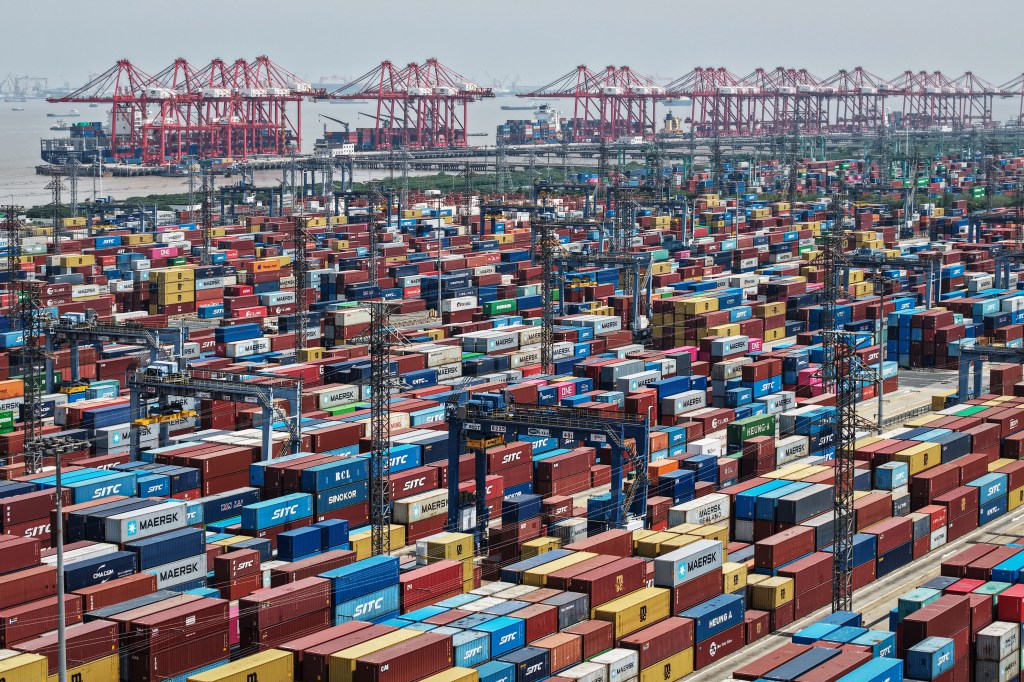US farmers in ‘full-blown crisis’ as Chinese orders for pork, soybeans plunge over Trump tariffs
President Trump’s tariffs have sent the US agricultural industry into a “full-blown crisis” as canceled orders from China are forcing farmers to lay off workers or shut down their businesses, according to a trade group.
China last week made its largest cancellation of pork orders since the COVID-19 pandemic in 2020, halting a shipment of 12,000 tons of pork, according to the Department of Agriculture.
Meanwhile, China dropped its soybean orders to just 1,800 tons’ worth in the week ending April 17 — down massively (more than 97%) from 72,800 tons purchased the week before, the USDA said.
Wes Shoemyer, who runs a family farm in Clarence, Mo., that raises cattle and grows grains, said he’s nervous about whether US exporters will find foreign markets for his crops.
“We are all still planting, but it’s on a leap of faith that there will be a foreign market to export it to,” he told The Post.
Trump’s 145% tariff on Chinese goods and the nation’s retaliatory 125% rate on the US have thrown a major wrench into trade across the board between the world’s two largest economies.
In response, there has been a drastic increase in canceled sailings by Chinese vessels to US ports, with China-to-US vessel traffic down 44% compared to a year earlier, according to the Vizion Global Ocean Bookings Tracker.
The impact of canceled Chinese orders will be felt across the industry — starting with farms forced to shutter, then slamming the longshoremen out of work from canceled sailings, then the truck drivers who transport goods from the ports, said Peter Friedmann, executive director of the Agriculture Transportation Coalition.
“It’s already happening,” Friedman said. “Unlike toys and television, so forth, it’s pretty dramatic. If nobody’s buying, you may harvest it because you got to get it off the trees, like cherries and fruit — but what do you do with it if you can’t sell it?”
Shoppers may see a temporary influx of cheaper produce at supermarkets — like cherries that cost a quarter of what they used to – but that’s just a sign of US farmers going out of business and giving away their excess supply, Friedmann said.
A wood pulp and paperboard exporter received an immediate cancellation of 6,400 metric tons of goods — and a hold on 15 railcars sitting in “demurrage,” when fees are charged for a delayed movement of goods, according to the AgTC.
The exporter has 9,000 metric tons of product already on the water, headed for China and expected to arrive May 13 — and the company worries it could be forced to divert that shipment to a costly warehouse if buyers refuse the cargo at port.
Meanwhile, a grass seed exporter told AgTC that it received just two weeks’ notice that eight loads were being canceled by Chinese customers, even though vessel bookings were already in place.
The Chinese market would be a huge loss for American farmers, who exported more than $27 billion worth of US agricultural goods to the country last year, according to the USDA.
US farmers across the country are already in crisis mode — from hay farmers to fruit and nut exporters to those growing cotton and hardwood lumber, according to Friedmann.
US soybean farmers, in particular, will lose out on a crucial market. China is the world’s top buyer of soybeans, importing nearly $13 billion worth from the US last year, according to the USDA.
But Zhao Chenxin, a top Chinese official with the development and reform commission, on Monday said the country will be fine without its supply of US grains like soybeans, corn and sorghum, which “can be easily substituted and the supplies on the international market are quite sufficient.”
The nation is expecting a huge shipment of the oilseed from South America as it continues to shift supply over to Brazil.
“Other countries have been treating us — our exports — unfairly for a long time. It is true,” Friedmann said.
“However, these are problems that have been generated over decades. They’ve developed gradually over decades. We cannot eliminate them with a snap of the fingers, with a sudden announcement, with a quickly imposed tariff,” he said.
“If nobody’s buying the soybeans, you can’t just cut hours — you have to eliminate hours. You can’t afford to pay people if nobody’s buying your products,” Friedmann told The Post.
US soybean farmers lost a good chunk of their share of the Chinese market to Brazilian counterparts during the 2018 trade war, during Trump’s first administration, according to the American Soybean Association.
Shoemyer, the farmer from Missouri, is doubly concerned over a contract he signed with the US government to grow cover crops — rye, wheat and grasses — on his land to help prevent runoff during the winter.
He invested $45,000 to plant the crops, but said DOGE has cut funding for the Soil and Water Outcomes Fund, which administered the grants to farmers, who are supposed to be paid later this month.
“I never thought I’d sign a contract with my own government and not get paid,” Shoemyer said.
A White House official told The Post that the Biden-era contract has been eliminated, but if the application meets requirements for the administration’s Advancing Markets for Producers (AMP) initiative, Shoemyer and other farmers should expect to receive a larger share of the project’s federal dollars.
“President Trump is eliminating Biden era climate slush funds and cutting bureaucracy and bloat in order to put farmers first. More money is going to farmers instead of NGOs,” White House deputy press secretary Anna Kelly told The Post.
The White House did not clarify whether the program qualifies for AMP funding.











